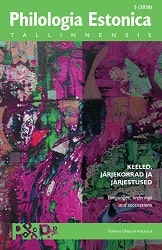Ema haridus ja pere elukoht eesti keelt emakeelena omandava lapse kasvukeskkonna mõjutajana
Education of the Mother and Residence of the Family as Factors Influencing the Linguistic Developmental Environment of Children Acquiring Estonian as L1
Author(s): Andra KütiSubject(s): Language acquisition, Sociolinguistics, Finno-Ugrian studies, Sociology of Education
Published by: Tallinna Ülikooli Kirjastus
Keywords: first language acquisition; sociolinguistics; linguistic environment; Estonian;
Summary/Abstract: Prior to the present study, there had been no study that provided a complete overview of the linguistic developmental environment of native Estonian-speaking pre-schoolers (ages 5–7). In the study underlying this paper, data from 152 semi-structured interviews with mothers are used to describe and discuss the importance of the frequency of factors that characterize the linguistic environment in the family home. Two groups are compared on the basis of the mother’s level of education: those families where the mother has secondary (specialized) education and those where she has higher education. In both groups, differences in urban and rural environment were also observed. The article rests on the thesis that different developmental environments also result in different language environments, and that the evolution of the developmental environment over time – i.e. the choices that are made by the parents and the beliefs that are important with respect to the development of the child – are more broadly influenced by the family’s socioeconomic status. The study reveals that the mothers resident in rural areas spoke to their children more during the pre-linguistic period and also that the role of grandparents in their social network was more important; additionally, more books were read and more stories were told in these families. Parents in urban areas more often attended events outside the family home; thus, their children came into contact more frequently with other languages and they spent more time at kindergarten. The level of education attained by the mother lead to them holding different attitudes about the linguistic capabilities of their children. For parents with higher education, this meant that the children spent more time alone, spending less time in front of screens and had more contacts with foreign languages than the children of mothers with secondary (specialized) education. In the case of children with mothers that had secondary (specialized) education, the role of grandparents in their social network was more important; they spent more time at kindergarten and played more with other children and/or friends of their age than they did alone.
Journal: Philologia Estonica Tallinnensis
- Issue Year: 5/2020
- Issue No: 1
- Page Range: 196-234
- Page Count: 39
- Language: Estonian

